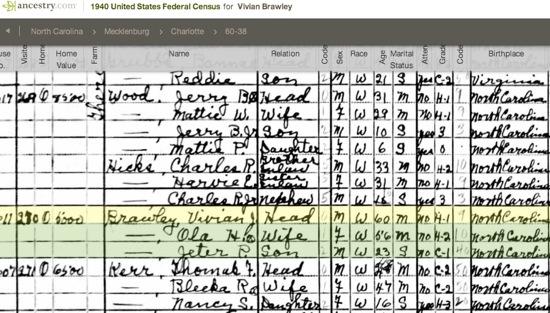Part of the fun of researching your family history on Ancestry is discovering the amusingly archaic names of your ancestors, like Elva, Gust, or Drucilla. But you might also find some puzzlers, like marriages between an Allison and a Sarah or a Vivian and an Ola:

That’s because some names that we now associate with women were once male names. Just as parents today give daughters masculine or androgynous names — Jordan, Taylor, Casey — so did your great-grandparents. The Social Security Administration keeps lists of the top 1,000 baby names dating back to 1880, when some girls were christened Joe, Frank, David, or Earl. Those may not have caught on with the ladies, but plenty of others have.
1. Lauren
First appearing on the SSA’s list in 1900, Lauren was almost exclusively a male name until 1945, though never a popular one. That year it broke into the SSA top thousand names for girls at #355—likely thanks to Lauren Bacall’s screen debut in 1944’s To Have and Have Not. By the 1960s it had solidified its place on the girls’ list, and it held a place among the top five female names for much of the 1980s and 1990s. Strangely, it experienced a resurgence as a male name at the same time, when it reappeared on the boys’ list in 1983 after a 20-year absence. Usually, once girls adopt a name, parents eschew it for boys.
2. Ashley
In the 1936 novel Gone with the Wind, Scarlett O’Hara is fixated on a perfect Southern gentleman named Ashley Wilkes. The name was fading out of use — perhaps that’s why Margaret Mitchell chose it for a character representative of the Old South — and didn’t appear among the top male baby names for a decade after 1928. But after the movie was released in 1939, Ashley surged back into use, appearing on the list of male names until 1994.
3. Leslie
Who played Ashley Wilkes in the movie of Gone with the Wind? Leslie Howard, a man born in 1893, when the name was among the top 100 for men in the United States. It stayed in the top 200 until 1967, after receiving a bump from the movie in the early 1940s. Even in 1893, there were a few girls with the name, but they only overtook the boys in 1952.
4. Allison
Allison was the 34th-most-popular girls’ name in 2013, but the name only appeared on the girls’ SSA list in 1946. As it happens, 1946 was the last year it appeared on the list of boys’ names as well. A celebrity is often the root of such a sudden shift. Perhaps this one is due to 1940s movie sweetheart June Allyson?
5. Meredith
A name with Welsh origins meaning “great chief,” Meredith was originally a male name but was used by both sexes in the early 20th century. Music Man songwriter Meredith Wilson (born 1902) is the best known in the male category. But by the time the hit show came out, his name was passé, exiting the boys’ list in 1954. In the 1970s and 1980s, it was among the top 200 names for girls.
6. Lindsay/Lindsey
When Fleetwood Mac’s Lindsey Buckingham was born in 1949, his name was already trending feminine, with 83 girls called Lindsay. The male version peaked in the 1880s and last appeared on the list in 1987, when it was given to just 95 boys. That year, nearly 14,000 girls were named Lindsey or Lindsay.
7. Whitney
Only appearing on the girls’ list in 1962, Whitney was originally a male name with Anglo-Saxon origins. Also a surname, it is derived from the Old English, meaning “island” or “higher ground,” and first appears in print as a town name in an early survey of England, the Domesday Book. All of which sounds strong and masculine, until the likes of Whitney Houston (born 1963) changed the connotation. When the singer’s debut album skyrocketed her to fame in 1985, Whitney jumped from No. 72 to No. 32 on the most popular girls’ name list. Soon after, it disappeared from the boys’ list.
8. Beverly
Poor Beverly. The name’s fallen out of fashion with both sexes, last appearing on the boys’ list in 1954 and the girls’ in 1999. In the 19th century, though, it was a somewhat common name for men, ranking near the top 500 in the 1880s, with roots in medieval England’s Saint John of Beverley. Women picked up Beverly in 1905, and within 30 years, it made the top 20. Surely it’s about time for a revival.
—Rebecca Dalzell